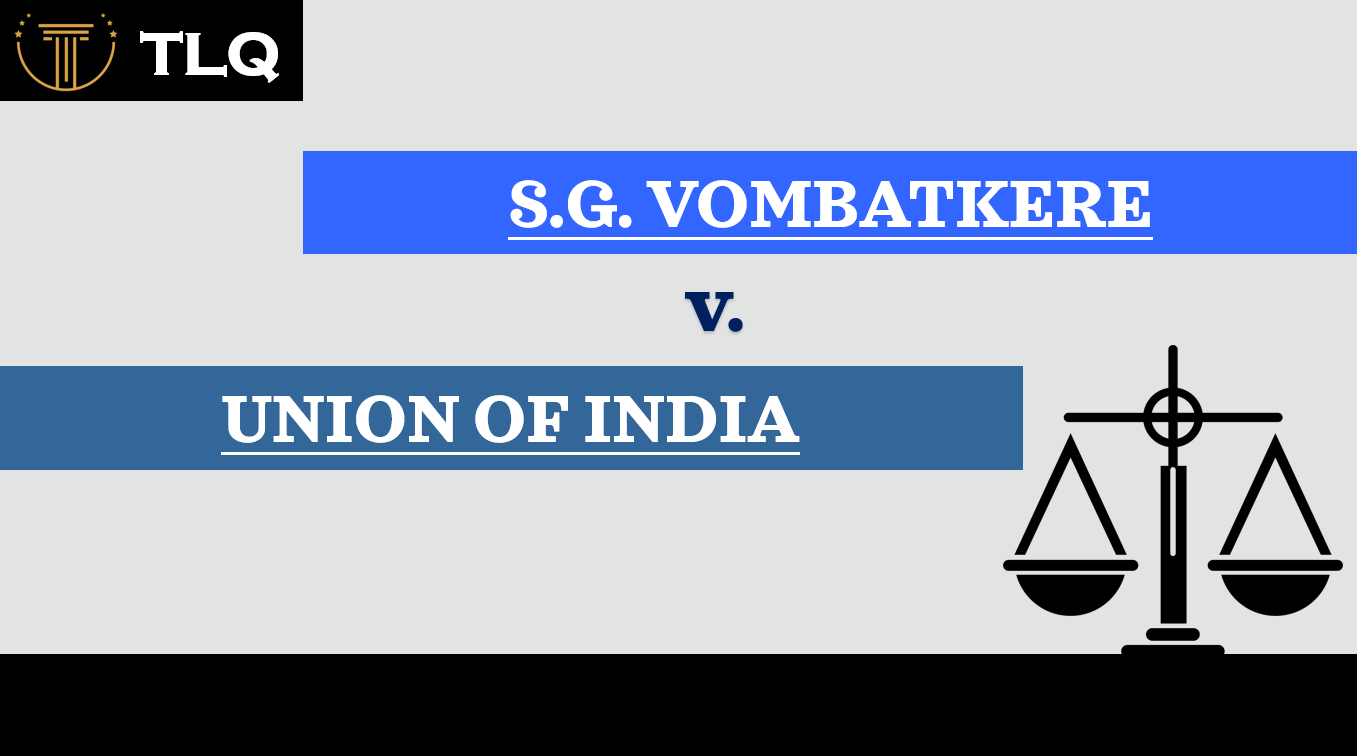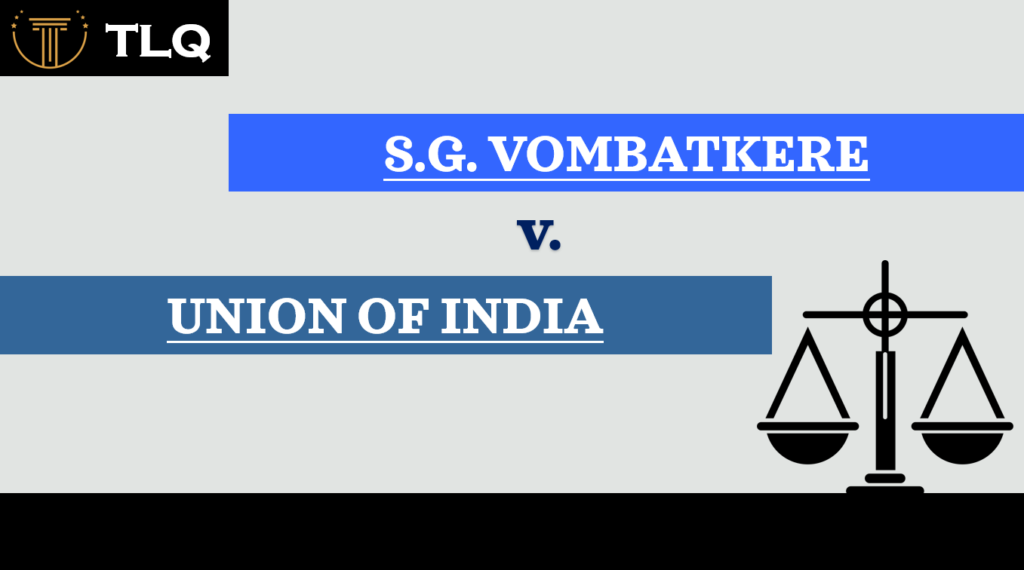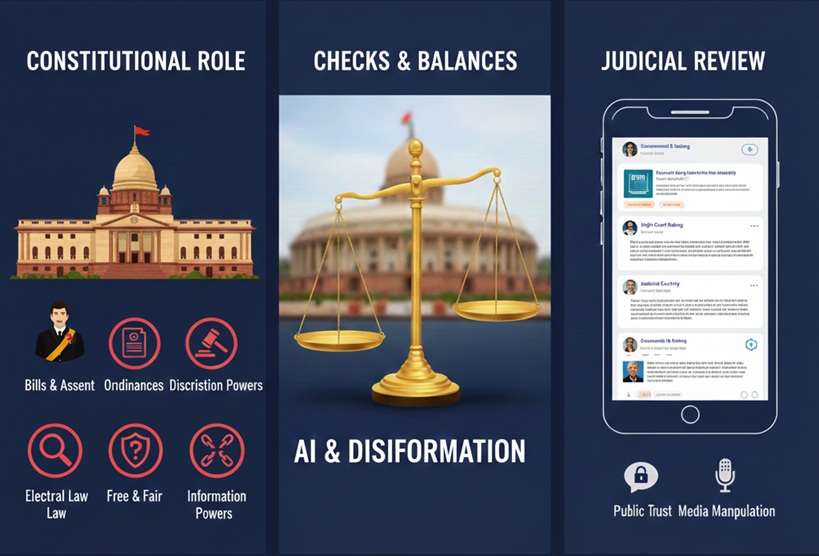Published On: 20th April, 2024

Authored By: Nandini.K.T
CMR University, School of Legal Studies
INTRODUCTION
“If we don’t believe in free expression for people we despise , we don’t believe in it at all”
-Noam Chomsky
India is a democratic, secular nation with a high level of integrity and sedition laws. The government and its citizens are constantly at odds.The very essence of democracy is the citizen’s right to voice out their opinion for the greater good of the society and nation.One law that often comes as a barrier to this very essence is the sedition law that is given in Section 124A of Indian Penal Code,1860.It is seen that in the present day especially when the voices of millions of citizens regarding the hidden concerns of the society and dissent against the government are considered highly crucial for good governance of the nation,this law is subjected to a lot of criticism.The law has received criticism for being a “colonial legacy” because the British used it to put down Indian rebellion.The Law Commission, however, determined that this was insufficient justification for the law’s repeal. Despite these criticisms, the Law Commission today declared that Section 124A is crucial for maintaining national security.
However,countries like Britain and Nigeria have held sedition law to be unconstitutional as it interferes with citizens’ freedom of thought and expression.There is also an increasing trend in the number of cases in the name of sedition which clearly show how it is undermining the rights that are guaranteed under Article 19(1),14,15 and 21 of the Indian Constitution. This case of S.G.Vombatkere v. Union of India deals with the violation of fundamental rights by Section 124A ,the relevance of the law in today’s era and the arbitrary powers involved therein.
BRIEF INSIGHTS ABOUT THE CASE
CASE NAME: S.G.Vombatkere v. Union of India
CITATION:(2022) 7 SCC 433
DECIDED ON:11 May 2022
BENCH: Honourable Chief Justice N.V. Ramana, Justice Surya Kant and Justice DY Chandrachud
FACTS OF THE CASE:
- The Chief Minister was referred to as a “puppet of Hindutva” in a video that Mr. Wangkhemcha, a journalist based in Manipur and anchor for local news channel ISTV, posted on social media. Mr. Wangkhemcha was arrested for his criticism of the Manipur government and its relationship with the current NDA government.
- Kanhaiya Lal Shukla, a journalist from Chattisgarh, took part in an alternative type of political commentary by publishing cartoons on social media that parodied the phony encounters that the Gujarat police are said to have staged between 2002 and 2006.
- Following the events that took place , both Mr. Shukla and Mr. Wangkhemcha were charged with sedition in 2018— more specifically Mr. Shukla in April and Mr. Wangkhemcha in August. They subsequently petitioned the Supreme Court in 2021 to challenge the law, raising issues with its historical background that is the colonial roots and present-day applicability and relevance.
- On February 17th 2021, two journalists, Kishore Wangkhemcha and Kanhaiya Lal Shukla, filed a petition in the Supreme Court challenging the constitutionality of sedition law.The law’s expansive scope has historically drawn criticism for being a means of stifling free speech. The petition submitted by Mr. Wangkhemcha and Mr. Shukla, contending that the provision’s ambiguity permits the arbitrary application of sedition law to stifle dissent, echoes this criticism.
- The petition submitted by Mr. Wangkhemcha and Mr. Shukla has been tagged with nine other petitions contesting the constitutionality of sedition, gaining new traction.
INITIAL PROCEEDINGS
Justice U.U. Lalit and Justice Ajay Rastogi, heard the case for the first time in July 2021. A copy of the Writ Petition was to be given by the petitioner to the Attorney General of India. The next hearing date was set for October 2021. The Central Government was given notice by the Supreme Court of India in April 2022 to submit a response to the aforementioned petition. In order to file the counter-affidavit that the court had provided, the Solicitor General of India requested further time from the court. Tushar Mehta, Solicitor General of India , submitted a written statement on behalf of the Union of India on May 7.
ISSUES DEALT WITH IN THE INSTANT CASE:
- Whether Section 124A of IPC,1860 violates freedom of speech and expression that is guaranteed under Article 19(1) of the Indian Constitution,1860.
- Whether the sedition law that is considered to be of colonial roots is outdated and does it have any relevance in today’s modern era.
- Whether the government abuses the legislation against sedition, giving them arbitrary power to quash dissent and limit criticism of the ruling party.
ARGUMENTS ADVANCED BY THE PETITIONERS:
- The counsel for the petitioners contended that Section 124A of IPC is in violation of the fundamental right of freedom of speech and expression that is enshrined in Article 19(1) of the Indian Constitution by eliminating any criticism against the ruling party or any form of political dissent.
- The petitioners further contended that considering the fact that India is a democratic nation, It cannot be overemphasized that when it comes to democracy, liberty of thought and expression is a cardinal value that is of paramount significance under the Constitutional scheme. According to the petitioners, poses a major threat to the nation’s democratic ideals and must be overturned. They said that this violates democratic norms because the legislation is being utilized to repress criticism and dissent which are essential for good governance.
- It was further argued by the counsel for the petitioners that Section 124A is a broad clause with vague phrasing that allows the government to abuse it and prevent people from voicing their legitimate opinions against the legalized government. The definition of an offense under the sedition law is arbitrary and ambiguous, and it provides the government far too much leeway. The precise meaning of the phrase “disaffection” in Section 124 of the Penal Code is ambiguous and indeterminable when using this test. Despite the definition of the terms in the section’s explanation to include disloyalty and hostility, this provision’s viability is uncertain and thus it fails the overbreadth test
ARGUMENTS ADVANCED BY THE RESPONDENTS
- The counsel for the respondents, Tushar Mehta, the Solicitor General of India contended that The legislation against sedition is crucial to preserving public order, national security, and sovereignty. And it follows democratic principles and that words which directly provoke violence or which directly threaten the maintenance of public order may deserve censure.
- The counsel further advanced their argument that the reasonableness of the rule and the existence of a nexus between the restriction it imposes and the goal it seeks to achieve serve as the litmus tests for arbitrariness. In the interest of the security of the State and the preservation of public order, Section 124A places limitations on the basic right to freedom of speech and expression and thus,it is not violative of fundamental rights nor it is arbitrary.
- The constitution includes a statute against sedition with the intention of placing reasonable restrictions that is clearly outlined in Article 19(2) of the Constitution on the right to free speech and expression and hence there is no ambiguity.
THE HONOURABLE APEX COURT’S JUDGEMENT
Having heard the contentions from both the parties,the Hon’ble Supreme Court of India observed that the core issue in the instant case includes the constitutional validity of Section 124A,the potential for increase in arbitrary power due to the vagueness and if there is any legal lacuna and its relevance in today’s time. The findings of the Hon’ble Court in the instant case holds supreme importance as civil society and human rights organizations broadly applaud the Supreme Court’s decision to put the sedition law in abeyance until further notice as an important step in safeguarding the nation’s democratic ideals which is given in paragraph 7 of the judgement. The court ruled that people who have already been arrested and are in custody for sedition are entitled to approach the court for bail. On May 11, 2022, the court issued an interim order and provided directions about Section 124-A.
The directions issued by the Hon’ble Supreme Court are as follows:
- The initial directive states that the interim order must be followed until additional orders are made. The Central and State Governments have been ordered by the Supreme Court to cease filing fresh FIRs, carrying out investigations, and applying coercive measures under Section 124A while the case is being reconsidered and re-examined.
- No fresh complaint may be filed in accordance with Section 124-A. Any individual who is the subject of a new Section 124-A case may seek appropriate relief from the court in question. The courts are urged to consider the requested relief in light of this Court’s order in the current instance.
- To keep on hold all ongoing hearings, appeals, and trials involving the charge brought up under Section 124-A of the IPC.However,adjudication of other sections may be continued if it appears to the court that no prejudice shall be caused to the accused.
- The Hon’ble Court ordered the Union Government to advise all the State governments and Union Territories to refrain from filing any more cases under Section 124A until further notice.
The Court also said that these directions are to be followed until further developments with regard to re-examination of the provision.
REASONING AND ANALYSIS
Sedition law is often used as a weapon to suppress dissent and the critical opinions of the citizens of the government even after it is time and again clearly established by the Courts through judicial pronouncements that “dissent is not sedition”.This was also established in the well-known case of Kedarnath v. State of Bihar.[1]Moreover, when there is no liberty to dissent then there is no democracy. The Hon’ble Calcutta High Court went on to say that even the judicial system and the legislative branch are open to fair criticism, which is why the Constitution protects freedom of speech and expression. This was the case of Sammy Banerjee Vs. State of West Bengal and others[2] wherein Justice Sabyasachi Bhattacharyya of the Calcutta High Court held that “The people always have a right to criticize the dispensation running the administration of the country, being the Government or the Executive.”
With regard to the concerns of ambiguity and the misuse of the section as raised by the counsel for the petitioners,The idea of democracy is fundamentally based on the freedom to query, critique, and replace sovereigns. The British overturned the law in their nation after introducing sedition to oppress Indians. There is no rationale for India not to repeal this clause. The terminology employed in section 124A as “disaffection” are ambiguous, open to various interpretations based on investigators’ whims and fantasies, and as a result, is frequently used inappropriately.
Furthermore, in the case of Ramesh Thapar v. State of Madras[3], the Hon’ble Court unequivocally observed: “Deletion of the word “sedition‟ from draft Article 13(2), therefore, shows that criticism of Government exciting disaffection or bad feelings towards it is not to be regarded as a justifying ground for restricting the freedom of expression and of the press, unless it is such as to undermine the security or tend to overthrow the state.”
After analyzing the previous judicial pronouncements and thoroughly observing the facts of the case, The Hon’ble Court came to the conclusion that there is a flaw in the provision which needs to be reexamined and modified in order to ensure freedom of expression, a fundamental right guaranteed under Article 19A of the Indian Constitution.
ANALYSIS
A critical analysis of the judgment in the present case points to two key areas that is of concern. Firstly, Direction(d),that is “All pending trials, appeals and proceedings with respect to the charge framed under Section 124-A IPC be kept in abeyance. Adjudication with respect to other sections, if any, could proceed if the courts are of the opinion that no prejudice would be caused to the accused.” on a bird’s view is problematic as it grants a stay on ongoing trials, appeals, and proceedings without addressing other associated problems, such as whether to grant bail to someone currently detained under Section 124-A of the IPC. Furthermore, the egregious issue is that the Supreme Court may not have given any specific instructions to release an accused person on bail while the Supreme Court decides whether or not the sedition law is constitutional. This would affect the accused person’s right to speedy justice, which is protected by Article 21 of the Indian Constitution.
CONCLUSION
When Mahatma Gandhi was tried in 1922 for his articles published in the magazine Youth India. Mahatma Gandhi said that ‘the section 124-A under which he was charged is perhaps the prince among the political sections of the IPC designed to suppress the liberty of the citizen’.Section 124A that often acts as a barrier for citizens in exercising their fundamental rights .The Supreme Court could also resolve the issue of divergent views by filling in the order’s gap and issuing a broad order granting bail to those who are accused of sedition and are currently incarcerated, pending the court’s decision on the law’s constitutionality or until it has undergone a thorough review. This would uphold the prisoners’ cherished right to life and liberty.The necessity for a solid legal framework to safeguard India’s fundamental right to free speech and expression has been brought to light by the SG Vombatkere v. Union of India case.
Reference(s):
[1] Kedarnath v. State of Bihar [1962 Supp. (2) S.C.R. 769].
[2] Sammy Banerjee Vs. State of West Bengal and others W.P. No. 21526 (W) of 2019
[3] Romesh Thappar v. The State of Madras, AIR 1950 SC 124





